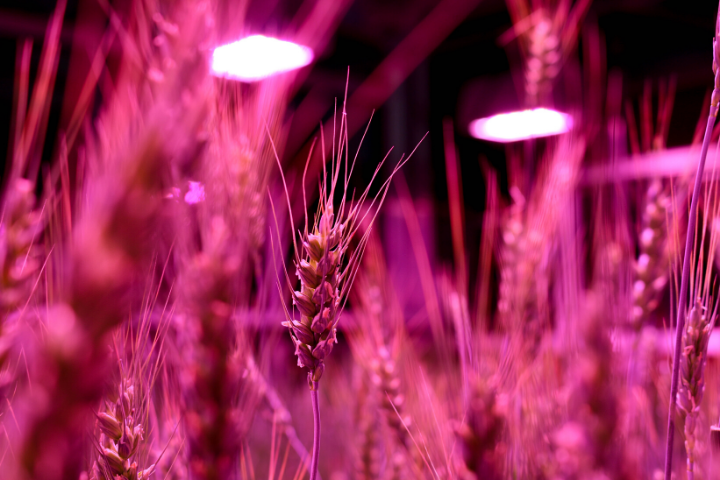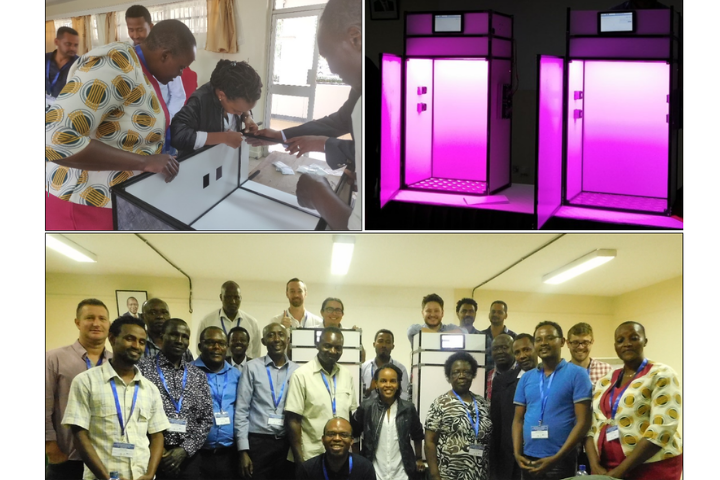Speed Breeding to Fast-track Crop Improvement in Africa
| 27 November, 2019 | Developers f1000 |

Wheat plants growing under continuous LED light to accelerate their growth. Photo courtesy of the University of Queensland
Accelerating crop growth could help improve concerns over global food security. Researchers have created a new tool that could improve the growth rate of crops, shortening the crop generation time and accelerating breeding. Dr Oluwaseyi Shorinola discusses this new approach, called ‘Speed Breeding’, and explains how this could benefit a growing population.
Over the next three decades, African researchers need to develop better-yielding and climate-resilient crop varieties to feed more than twice its current population using a limited land resource. However, new crop varieties are being developed at a painstakingly slow rate.
To develop a new crop varieties, plant breeders cross-pollinate old varieties each selected for desired traits, such as high yield or disease resistance, to make new lines which are then cycled through several generations to ensure that the newly acquired traits are stable. This process can take up to 15 years in some crops.
A new approach called Speed Breeding, which was inspired by NASA’s effort to grow plants in space, has now been introduced to drastically shorten the development time.
In two seminal papers published as Nature covers last year, the growth time of long-day crops like wheat and barley were halved by simply adjusting the duration and quality of light that they receive. For instance, when wheat plants were grown under 22 continuous hours of light and just two hours of darkness, scientist could harvest viable seeds in just about 66 days compared to 120 days required under normal growth conditions. Speed Breeding can also be used for many short-day crops grown in Africa by artificially extending their hours of growth under darkness.
To help breeders in East Africa take advantage of Speed Breeding in their research, a Speed Breeding workshop was organized as part of the FLAIR fellowship award to Dr Oluwaseyi Shorinola of BecA-ILRI Hub, Kenya. The FLAIR fellowship is a Royal Society program in collaboration with the Africa Academy of Sciences to develop future research leaders in Africa. The workshop brought together 20 researchers from three countries in East Africa (Kenya, Ethiopia and Sudan) working on nine different crops: wheat, maize, teff, sorghum, soybean, cassava, potato, linseed and faba bean.
The workshop participants were introduced to different “Speed Breeding” protocols by an international team of facilitators from the John Innes Centre (UK), Quadram Institute (UK), University of Queensland (Australia) and BecA-ILRI Hub. One of the lead scientists, Dr Lee Hickey from the University of Queensland, on the two seminal Nature papers on “Speed Breeding”, was on hand to facilitate discussions on tailoring Speed Breeding for use on African crops.
Setting up Speed Breeding facilities is relatively easy. It mainly requires time-programmable and good quality LED to artificially extend light period for long-day plants, or opaque black-out shelters to artificially extend the duration of growth in darkness for short-day plants.
One of the highlights of the workshop was the construction of two low-cost Speed Breeding cabinets. African breeders at the workshop swapped their crossing bags and field books for screw drivers and a suite of electronic gadgets to build two functional bench-top Speed Breeding cabinets. Each cabinet costs approximately $1,000 to construct.

The cabinets were afterwards donated to Dr Jame Njoroge of the Kenya Agricultural and Livestock Research Organization (KALRO) who intends to develop a Speed Breeding protocol to shorten the growth cycle of soybean, and to Mr Mengistu Berhanu and Sisay Arega of the Ethiopian Institute of Agricultural Research (EIAR) who will be testing Speed Breeding protocols on linseed and faba bean respectively. There is also work under way to set up Speed Breeding green houses at KALRO to fast-track the wheat breading program in Kenya.
The workshop was made possible by funding support from the Royal Society, John Innes Centre, Quadram Institute and OpenPlant.